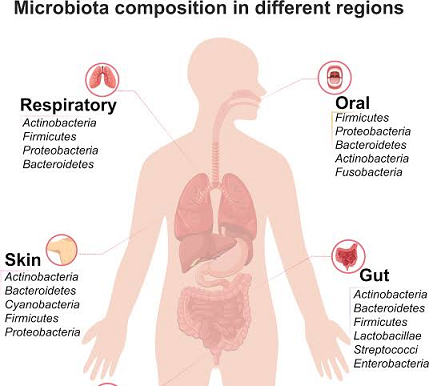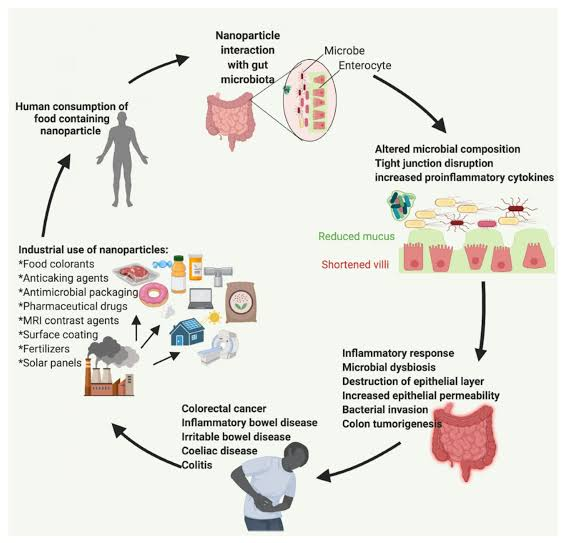Definition :
The gut microbiota comprises trillions of microorganisms, including bacteria, viruses, fungi, and protozoa, residing in the human gastrointestinal tract. The gut microbiota plays an important role in overall health including:
- Digestion and absorption of nutrients
- Immune function
- Brain health
- Mental health
- Weight management
- Skin health
- Cancer prevention
Types of Gut Microbiota :
There are two main types of gut microbiota:
-
Probiotics
: These are beneficial bacteria that can improve health. They can be found in fermented foods such as yogurt, kefir, and sauerkraut.
-
Prebiotics:
These are non-digestible food ingredients that promote the growth of beneficial bacteria in the gut. These microorganisms are present in various foods like onions, garlic, and bananas.
Let’s take a closer look at the different types of gut microbiota that exist within us:
Bacteroidetes: These bacteria are linked to the breakdown of complex carbohydrates and the regulation of appetite.
Firmicutes: These microbes are involved in the extraction of energy from food and are linked to obesity when their balance is disrupted.
Actinobacteria: These bacteria play a crucial role in synthesizing essential compounds such as vitamins and short-chain fatty acids.
Proteobacteria: This group includes pathogens and can cause health issues when their numbers are too high.
Verrucomicrobia : These bacteria play a role in regulating metabolism and immune function.

Causes of Gut Microbiota Imbalance :
There are many factors that can cause an imbalance in gut microbiota, including:
- Antibiotic use
- Stress
- Poor diet
- Lack of exercise
- Irritable bowel syndrome (IBS)
- Celiac disease
- Inflammatory bowel disease (IBD)
Moving on, various health conditions have been linked to an imbalance in gut microbiota. Here’s how you can cope with some of these conditions:
Digestive Issues : Probiotics and fiber-rich foods can support gut health and alleviate digestive problems.
Mental Health: Increasing evidence suggests that the gut microbiota influences mental health conditions such as anxiety, depression, and autism spectrum disorder. Strategies such as practicing stress-reduction techniques like meditation and yoga can contribute to maintaining a healthy gut-brain connection.
Autoimmune Disorders: It is advisable to consult with a healthcare professional to explore specialized diets and medications as part of a comprehensive management plan.
Obesity: Achieving weight management is facilitated by adopting a balanced diet that includes fruits, vegetables, and lean proteins, combined with regular exercise
Cancer: Some studies have suggested that gut microbiota imbalance may be a risk factor for certain types of cancer, such as colon cancer.
Management of Gut Microbiota Imbalance :
There are a number of things you can do to manage gut microbiota imbalance, including:
-
Dietary Changes:
- Fiber-rich Foods: Incorporate a variety of high-fiber foods like fruits, vegetables, whole grains, and legumes into your diet. Fiber is essential for the growth of beneficial bacteria in the gut.
- Probiotic Foods: Incorporate fermented foods into your diet, including options like yogurt, kefir, sauerkraut, kimchi, and kombucha These foods contain live beneficial bacteria that can help restore gut balance.
- Prebiotic Foods: Include prebiotic-rich foods like garlic, onions, leeks, asparagus, and bananas in your diet. Prebiotics are compounds that nourish beneficial gut bacteria.
-
Probiotic Supplements :
Consider taking probiotic supplements, especially if you have specific digestive issues or have recently taken antibiotics. Seek advice from a healthcare professional to determine the most suitable probiotic strain for your specific needs.
-
Avoid Overuse of Antibiotics:
Antibiotics can disrupt the gut microbiota. Only use them when necessary, and if prescribed, make sure to complete the entire course as directed by your healthcare provider.
-
Reduce Sugar and Processed Foods :
High-sugar and highly processed diets can negatively impact gut bacteria. Reduce the consumption of sugary and processed foods.
-
Manage Stress :
Chronic stress can affect gut health. Incorporate stress-reduction techniques into your routine, such as meditation, yoga, deep breathing exercises, or regular physical activity.
-
Adequate Sleep :
Prioritize getting enough quality sleep, as sleep patterns can influence the gut microbiota.
-
Stay Hydrated :
Ensure adequate hydration by consuming plenty of water to promote overall digestive health.
-
Limit Alcohol and Caffeine :
Overconsumption of alcohol and caffeine can disrupt the balance of the gut microbiota. Consume them in moderation.
-
Diversify Your Diet :
A diverse range of foods can promote a diverse gut microbiota. Aim for a varied diet to support different types of beneficial bacteria.
-
Consult a Healthcare Professional :
If you suspect severe gut microbiota imbalance or have digestive issues, consult a healthcare provider. Healthcare professionals might suggest specialized tests or treatments tailored to your specific condition.
-
Avoid Smoking :
Smoking has been associated with an imbalance in gut bacteria. Quitting smoking can have a positive impact on gut health.
-
Probiotic Enemas:
In some extreme cases, fecal microbiota transplantation (FMT) may be considered. This process entails transferring fecal matter from a healthy donor to the colon of a recipient to restore a healthy gut microbiota. FMT is typically reserved for severe cases of gut dysbiosis and is performed under medical supervision.
Remember that the effectiveness of these strategies can vary from person to person, and it’s important to consult with a healthcare professional for personalized advice and treatment options if you If you suspect an imbalance in gut microbiota or experience persistent digestive issues.

Precautions :
If you are considering taking probiotics or prebiotics, it is important to talk to your doctor first. Some probiotics and prebiotics can interact with medications or other health conditions.
It is also important to note that there is still much that we don’t know about gut microbiota and its role in health. Additional research is required to comprehensively comprehend how gut microbiota can be utilized in the prevention and treatment of various health conditions.
Understanding the intricate relationship between gut microbiota and overall health is a fascinating journey that can lead to better well-being and a happier, healthier you.
Frequently Asked Questions ( FAQs) ;
What is the gut microbiota?
The gut microbiota, also known as gut microbiome or gut flora, refers to the diverse community of microorganisms (bacteria, viruses, fungi, and other microbes) that inhabit the gastrointestinal tract, particularly the large intestine.
What is the importance of gut microbiome in digestion?
The gut microbiota plays a crucial role in digestion by breaking down complex carbohydrates, fermenting dietary fibers, producing vitamins (such as vitamin K and certain B vitamins), and metabolizing certain nutrients that the human body cannot digest on its own.
How does gut microbiota affect immune system?
The gut microbiota interacts with the immune system and helps regulate immune function. Beneficial gut bacteria contribute to immune system development, maintain intestinal barrier function, and protect against pathogens by competing for resources and producing antimicrobial substances.
Can the gut microbiota affect mental health?
Emerging research suggests that the gut microbiota may play a role in mental health and brain function through the gut-brain axis. Changes in gut microbiota composition (dysbiosis) have been linked to mood disorders such as depression and anxiety, as well as neurological conditions such as Parkinson's disease and Alzheimer's disease.
Can the gut microbiome influence our body weight and metabolism?
The gut microbiota can influence weight and metabolism through various mechanisms, including energy extraction from food, regulation of appetite and satiety hormones, and modulation of metabolic pathways involved in glucose and lipid metabolism. Imbalances in gut microbiota composition have been associated with obesity and metabolic disorders.
What factors can affect the composition of the gut microbiota?
The composition of the gut microbiota can be influenced by numerous factors, including diet, lifestyle, genetics, age, medications (such as antibiotics and proton pump inhibitors), stress, and environmental exposures (such as pollution and sanitation).
Are prebiotics and probiotics good for gut health?
Probiotics are live microorganisms that, when consumed in adequate amounts, confer health benefits to the host by modulating the gut microbiota. Prebiotics are non-digestible fibers that serve as food for beneficial gut bacteria, promoting their growth and activity. Consuming probiotic-rich foods (such as yogurt, kefir, and fermented vegetables) and prebiotic-rich foods (such as whole grains, fruits, and vegetables) can help support a healthy gut microbiota.
What role does the gut microbiota play in gastrointestinal disorders?
Imbalances in gut microbiota composition have been implicated in various gastrointestinal disorders, including irritable bowel syndrome (IBS), inflammatory bowel disease (IBD), celiac disease, and gastroesophageal reflux disease (GERD). Restoring microbial balance through dietary changes, probiotics, or fecal microbiota transplantation (FMT) may be beneficial in managing these conditions.
What is the fastest way to restore gut microbiome?
Promoting a healthy gut microbiota involves adopting a balanced diet rich in fiber, fruits, vegetables, and fermented foods, avoiding excessive use of antibiotics and unnecessary medications, managing stress, getting regular exercise, and maintaining good hygiene practices.
Can changes in the gut microbiota affect allergies and autoimmune diseases?
Yes, alterations in gut microbiota composition have been associated with an increased risk of allergies, autoimmune diseases, and other immune-related disorders. A balanced and diverse gut microbiota is thought to play a role in maintaining immune tolerance and preventing excessive immune responses against self-antigens.






